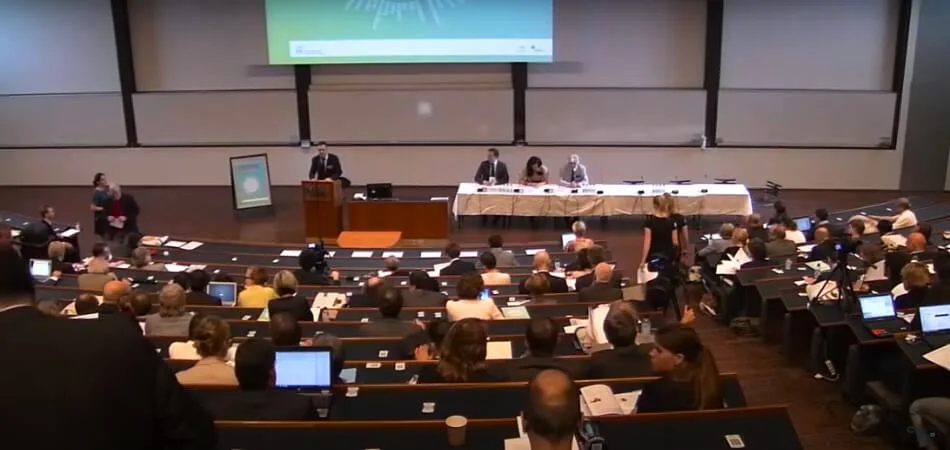Conference organizers are the architects behind intellectual gatherings that bring professionals together to exchange ideas and knowledge. But the big question often asked is, do conference organizers make a good profit?
Yes, conference organizers can make a good profit, but it depends on factors such as conference size, industry niche, reputation, location, economic conditions, and market trends. These factors play a crucial role in determining profitability.
In this article, we will take a deep dive into the critical elements that define the bottom line for conference organizers. Join us on this exploration as we figure out the secrets behind the profitability of these intellectual gatherings.
Who are the Conference Organizers?
Conference organizers are the behind-the-scenes heroes who bring professional events to life. They are experts in coordinating and managing conferences, ensuring that every detail runs smoothly. These dedicated professionals work tirelessly to create memorable experiences for attendees, from securing top-notch speakers to arranging engaging workshops and networking sessions.

One of the primary roles of conference organizers is to choose the perfect venue, considering factors like accessibility and amenities. They also play a vital role in marketing the event, reaching out to potential participants and sponsors to ensure a successful turnout. Whether they are organizing conferences in Canada, the United States, or other global destinations, these professionals adapt each event to suit regional needs and industry expectations. During the conference, these top conference organizers are the go-to people for problem-solving, ensuring everyone’s needs are met.
Conference organizers are the architects of knowledge-sharing platforms, where industry experts and enthusiasts come together to learn and grow. Their passion for creating impactful events fuels the success of conferences, making them indispensable contributors to the world of professional development.
Do Conference Organizers Make a Good Profit?
Yes, conference organizers have the potential to make a good profit, but various factors influence this outcome. And when people are aware of the factors that impact profitability, they won’t really ask “Do conference organizers make a good profit”. Now, let’s go through the key factors that shape the financial success of conference organizers.
Conference Size Matters
The size of the conference plays a crucial role in determining profitability. Larger conferences tend to attract a higher number of attendees and sponsors, resulting in increased revenue potential. With more participants and sponsors, organizers can generate higher income through conference registration fees, exhibitor fees, and partnerships. This size-driven revenue boost can significantly impact overall profitability.
Industry Niche
The choice of industry or niche can greatly affect profit margins. Organizing conferences in lucrative sectors with high demand can lead to better financial outcomes. Industries with a strong appetite for knowledge-sharing and networking often yield higher sponsorship opportunities and ticket sales, contributing to increased profits for organizers.
Reputation and Brand Recognition
Established conference organizers with a strong reputation and brand recognition have a competitive edge. Their track record of successful events can attract more participants and sponsors. Attendees and sponsors alike are more likely to trust organizers with a proven history of delivering high-quality conferences, leading to increased profitability through repeat business and referrals.
Location and Destination
Selecting an appealing location and destination can significantly impact a conference’s profitability. Popular and desirable locations can attract more attendees, especially if they offer unique attractions or convenience. Such destinations can lead to increased registration numbers, higher sponsorship interest, and ultimately, greater profit for organizers.
Economic Conditions
Economic factors can influence both sponsorship and attendee participation. In a strong economy, companies may allocate larger budgets for marketing and sponsorship, leading to increased investment in conferences. Moreover, individuals may be more willing to attend conferences when their financial outlook is positive. Conversely, during economic downturns, organizers may face challenges in securing sponsors and attendees, affecting profitability.
Market Trends
Staying attuned to market trends is essential for conference organizers. Adapting to changing industry dynamics and attendee preferences is crucial for success. Organizers who anticipate and respond to emerging trends, such as virtual and hybrid event formats, innovative content delivery methods, and sustainability considerations, are better positioned to attract participants and sponsors, ultimately impacting profitability positively.
Therefore, making money as a conference organizer depends largely on registration fees, sponsorships, and exhibitor fees. Although conference organizers can indeed achieve good profitability, their success hinges on strategic choices related to conference size, industry selection, reputation, location, economic conditions, and market trends. These factors collectively shape the financial outcomes of their endeavors.
Significance of Conference Organizers in Event Planning
Conference organizers play a crucial role in event planning, contributing significantly to the success of gatherings. Here’s their significance:
- Expert Planners: These professionals are skilled in precisely planning and executing every aspect of an event, ensuring a seamless and well-organized experience for attendees.
- Speaker Curation: They take the lead in sourcing and selecting knowledgeable and engaging speakers, enriching the event’s content, and delivering valuable insights to participants.
- Logistics Masters: Conference organizers excel in handling logistics, from carefully choosing the ideal venue that suits the event’s needs to creating a detailed schedule that keeps everything on track. This expertise allows clients to focus on the big picture while leaving the finer details to the experts.
- Marketing Wizards: Effective promotion is a cornerstone of event success, and organizers are adept at marketing events to the right audience. Their strategies maximize participation and attract valuable sponsorships, boosting the event’s impact.
- Problem Solvers: In the unpredictable world of event planning, organizers are quick thinkers and adept problem solvers. They tackle unexpected challenges with grace and ensure that the event runs smoothly, regardless of any hiccups.
- Attendee Satisfaction: Organizers prioritize attendee needs and comfort, creating a positive and engaging environment. Their dedication to attendee satisfaction encourages meaningful connections and leaves a lasting impression on participants.
Conference organizers bring a wealth of expertise to the table, streamlining the planning process, and elevating the overall event experience. Their multifaceted roles are instrumental in making events not only successful but also memorable and impactful.
Sources of Revenue for Conference Organizers
Conference organizers rely on various sources of revenue to ensure the success and profitability of their events. These revenue streams are essential in covering expenses, delivering a valuable experience to attendees, and generating income. Let’s explore these sources in detail:
Registration Fees
Registration fees are a fundamental source of revenue for conference organizers. Attendees pay these fees to access conference sessions, workshops, and networking opportunities. Fees often vary based on factors like early bird discounts, membership status, and the duration of the event. This revenue helps cover event logistics and planning costs.
Sponsorships and Exhibitors
Sponsors and exhibitors contribute significantly to conference finances. Companies pay for the opportunity to showcase their products or services to a targeted audience. Sponsorship packages can include branding, speaking opportunities, and exclusive access, providing essential financial support to organizers.
Grants and Funding
In certain cases, conferences secure grants and funding from government agencies, foundations, or organizations aligned with the event’s objectives. These funds support event expenses and may allow for reduced registration fees, making the conference accessible to a broader audience.
Merchandise Sales
Organizers often offer branded merchandise for sale, including T-shirts, mugs, and conference materials. Attendees purchase these items as keepsakes and to support the event financially. Merchandise sales add a supplementary revenue stream.
Advertising and Promotion
Conferences can partner with media outlets or sponsors to sell advertising space in event materials, websites, or promotional campaigns. This revenue complements other income sources and assists in offsetting various event costs.
Virtual Event Access Fees
With the rise of virtual and hybrid events, organizers can charge access fees for online attendees. This approach extends the reach of the conference to a global audience while monetizing the delivery of content and interactive experiences. Reaching a global audience serves as one of the key organizational benefits of conferences.
Conference organizers leverage a combination of registration fees, sponsorships, grants, merchandise sales, advertising, and virtual event access fees to generate revenue. A diversified approach to income sources is vital for ensuring the financial sustainability and profitability of conferences, allowing organizers to deliver valuable and memorable experiences to attendees.
Strategies for Maximizing Conference Organizers’ Profit
Maximizing profit for conference organizers involves strategic planning and execution. Here are some effective strategies to enhance profitability:
- Diverse Revenue Streams: Beyond registration fees, organizers can explore revenue sources like sponsorships, exhibitor fees, merchandise sales, and virtual event access fees. Diversification reduces reliance on a single income stream.
- Early Bird Incentives: Offering discounted rates for early registrants not only boosts revenue but also provides organizers with early budget predictability, aiding in financial planning.
- Tiered Pricing: Implementing tiered pricing structures with different registration levels and benefits caters to a broader audience. This strategy appeals to various attendee preferences and maximizes revenue potential.
- Targeted Marketing: Data-driven marketing allows organizers to reach the right audience, increasing attendee numbers and attracting sponsors seeking valuable connections.
- Enhanced Networking Opportunities: Creating effective networking experiences can attract more attendees and sponsors seeking valuable connections, enhancing the overall event value.
- Cost Optimization: Negotiating vendor contracts, minimizing waste, and leveraging cost-effective solutions help streamline expenses, contributing to increased profitability.
- Feedback Utilization: Gathering feedback from attendees and sponsors provides valuable insights for making improvements that enhance event value and attendee loyalty.
- Hybrid Events: Adopting hybrid event formats enables organizers to reach a global audience by offering both in-person and virtual participation options. This approach expands registration and sponsorship opportunities.
These strategies, including revenue diversification, early bird incentives, tiered pricing, targeted marketing, networking enhancements, cost optimization, feedback utilization, and hybrid event formats, collectively maximize profitability for conference organizers.
Frequently Asked Questions
In this section, we explore common questions about the profitability of conference organizers. If you’re wondering about the financial aspects, potential earnings, and factors that influence profitability, you’re in the right place. Our FAQs aim to provide clear insights to help you understand the business side of organizing conferences!
What is the main purpose of a conference?
The primary purpose of a conference is to create an opportunity for the exchange of ideas, information, and knowledge among participants. It serves as a platform for professionals, scholars, and experts to discuss their research, share findings, and collaborate on projects. Conferences also offer opportunities for networking, building relationships, and staying updated on the latest developments in a particular field.
How do you make a conference successful?
A successful conference requires careful planning, effective communication, and a focus on the participant experience. Clear objectives, a well-structured agenda, and engaging speakers are essential. Providing opportunities for networking and feedback is also crucial for creating a memorable and valuable event.
What is the importance of organizing a conference?
Organizing a conference is important for several reasons. It enhances collaboration, promotes knowledge sharing, and establishes connections within a specific field. Conferences can also uplift the profile of individuals, institutions, and cities while driving economic growth through tourism and local spending.
What are the four features of a successful conference?
A successful conference should have clear objectives, a well-structured agenda, engaging speakers, and ample opportunities for networking and collaboration. These features ensure that participants have a valuable and memorable experience.
What are the key elements to organize a conference?
To organize a successful conference, key elements include setting clear objectives, choosing a suitable venue, developing a comprehensive agenda, selecting qualified speakers, managing logistics efficiently, and promoting the event effectively.
Conclusion
Conferences are active gatherings that hold the potential for profitability, and the pivotal role of conference organizers cannot be overstated. The question, do conference organizers make a good profit resonates throughout this landscape? It’s a journey influenced by factors such as conference size, industry niche, location, and market trends.
Conference organizers are the unsung heroes behind these intellectual gatherings, curating experiences that balance profitability with exceptional value. Their mastery of logistics, speaker selection, marketing, and problem-solving elevates events to success. Within this journey, they strive to unlock the secrets to profitability while promoting an environment for meaningful learning and growth.
In the end, conferences and their organizers create spaces where knowledge-sharing thrives. This encapsulates their ongoing pursuit of financial success, all while shaping platforms for intellectual enrichment.







